| Srl | Item |
| 1 |
ID:
156246
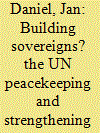

|
|
|
|
|
| Summary/Abstract |
This paper contributes to the debate on the recent ‘stabilization turn’ in United Nations (UN) peacekeeping by inquiring into a changing set of practices by which the UN intends to ‘strengthen the authority of the state.’ Drawing on Piiparinen’s notion of sovereignty-building as an emerging paradigm of conflict management, the study analyses the support for state authority and sovereignty in two modalities of contemporary UN peace operations – UNIFIL II and MINUSMA. While the two analysed missions significantly differ when it comes to the extent of their tasks, or the rules for the use of force, they both highlight the importance of local politics and agency in the implementations of their mandates and the need to strike a compromise between the contending visions on what form of sovereignty should be supported. By doing so, the paper points out the importance of ‘local’ and contextual emergence of the practices of sovereignty-building.
|
|
|
|
|
|
|
|
|
|
|
|
|
|
|
|
| 2 |
ID:
101811
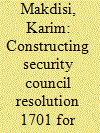

|
|
|
|
|
| Publication |
2011.
|
| Summary/Abstract |
This article argues that the 'war on terror' gave global meaning to the 2006 Israel-Lebanon war and to the construction of UN Security Council resolution 1701 that authorized the deployment of robust UN peacekeepers in southern Lebanon (UNIFIL). It uses a critical, discursive approach to argue that UN resolutions have embedded in them a particular, powerful discourse, in this case the 'war on terror'. This discourse grounded a global struggle for and against US domination of the region in a local power dispute in Lebanon between 2004 and 2008. It concludes that Israel's failure to defeat Hizbullah militarily resulted in resolution 1701 comprising two contradictory narratives that represented the battle for and against US domination, and that the subsequent battle for hegemonic articulation of this resolution weakened, rather than strengthened the Lebanese state during 2006-08, plunging Lebanon into internal strife until the signing of a national peace accord in Doha in May 2008.
|
|
|
|
|
|
|
|
|
|
|
|
|
|
|
|
| 3 |
ID:
069903
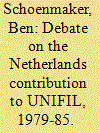

|
|
|
|
|
| Publication |
2005.
|
| Summary/Abstract |
This article examines the motives of the Dutch government for participating in UNIFIL in 1979 and for withdrawal after six years. The Dutch government was swayed mainly by considerations of national prestige. It decided to participate in UNIFIL as a way to improve the standing of the Netherlands in the world. From the outset, the Dutch government had little faith in the feasibility of the mandate and the usefulness of the operation. It would also have preferred to leave southern Lebanon as soon as possible, but the fear of losing international credibility and putting a spanner in the works of US diplomacy deterred it from taking that step.
|
|
|
|
|
|
|
|
|
|
|
|
|
|
|
|
| 4 |
ID:
096941
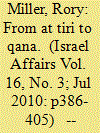

|
|
|
|
|
| Publication |
2010.
|
| Summary/Abstract |
In the period between 1978 and 2001 Ireland undertook the most significant operational tasking in its history on behalf of the United Nations, when it sent almost 40,000 troops to participate in the UNIFIL operation in Lebanon. This commitment increased Irish prestige across the international arena but it also had a highly negative impact on bilateral diplomatic and political relations between Ireland and Israel due to clashes and tensions between Irish UNIFIL peacekeepers and Israeli troops and their south Lebanese Christian allies. This article charts and examines the deterioration in Irish-Israeli relations and shows how events in Lebanon dominated the bilateral agenda in these two decades.
|
|
|
|
|
|
|
|
|
|
|
|
|
|
|
|
| 5 |
ID:
024206


|
|
|
|
|
| Publication |
Boulder, Lynne Rienner Publishers, 1989.
|
| Description |
viii, 279p.
|
| Standard Number |
1555871356
|
|
|
|
|
|
|
|
|
|
|
|
Copies: C:1/I:0,R:0,Q:0
Circulation
| Accession# | Call# | Current Location | Status | Policy | Location |
| 031190 | 341.584/SKO 031190 | Main | On Shelf | General | |
|
|
|
|
| 6 |
ID:
149126
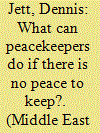

|
|
|
|
|
| Summary/Abstract |
They have a combined annual cost of $700 million, have been around for decades, are staffed by 14,000 soldiers and civilians and today do not seem to be accomplishing much of anything. What are they? The four peacekeeping operations (PKOs) in and around Israel. Put another way, why do all four of these operations continue to exist if there is currently so little peace to keep? There are a number of reasons for this paradox of peacekeeping, and an explanation requires taking a look at each of the four PKOs: the UN Truce Supervision Organization (UNTSO), the UN Disengagement Observer Force (UNDOF), the UN Interim Force in Lebanon (UNIFIL) and the Multilateral Force and Observers (MFO), which is not a UN operation.
|
|
|
|
|
|
|
|
|
|
|
|
|
|
|
|